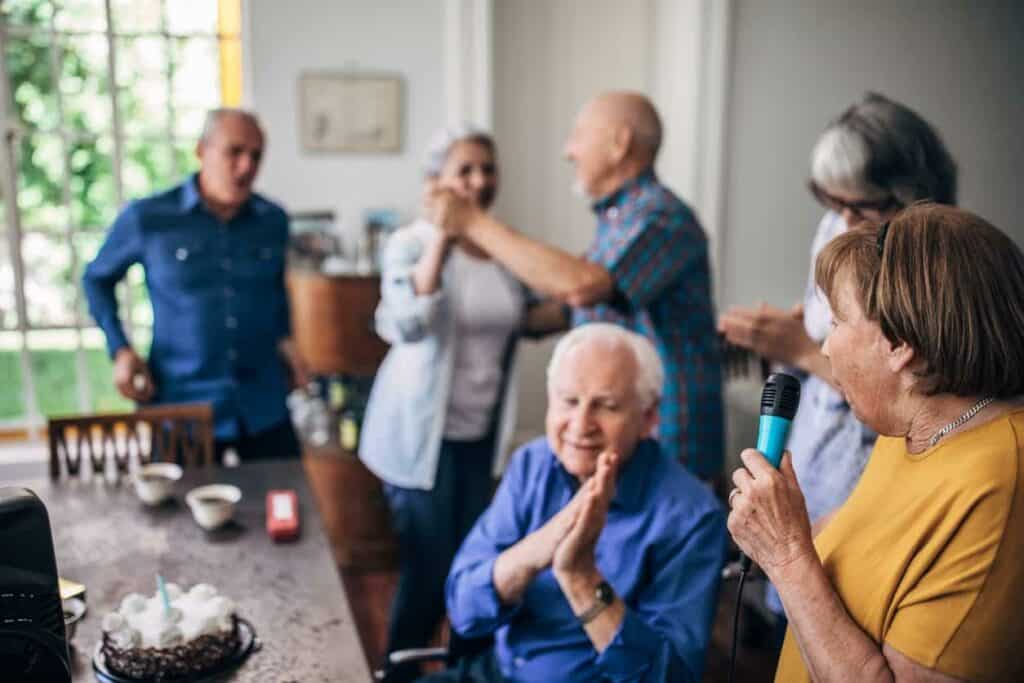
25+ Joyful Indoor Activities for Seniors That Will Transform Their Day
As seasons change in Reno and Carson City, or when mobility becomes a challenge, finding engaging indoor activities for seniors can feel like a difficult
It’s 4 p.m., and Grandma comes in rushing from the back garden, where she loves spending time with her flowers, gossiping with the neighbors, or quietly crocheting something. She puts the kettle on, finds my grandad’s mug, the one with the blue stripes, and lays out the placemat with a plate of two of his favorite cookies with walnuts and raisins, two sugar cubes, a napkin, and a teaspoon. When the table is set, and the tea is steaming in the cup, she helps him get up and sit at the table.
For the next fifteen to twenty minutes, he would be sitting there with a blissful, although slightly absent, expression on his face, looking almost like his old, relaxed self. But if she is a bit late, there are not enough cookies, or the tea is in a different mug, he would start sulking, clattering noisily with the utensils, or even shouting insults. On many occasions, before Grandma perfected this ritual, he would throw the saucer or try to go out of the apartment. Grandma would ask us to be as quiet as possible and generally avoid his room until it was time for him to go to bed.

We thought he was being cranky or just his weird self – sometimes remembering us and others not being sure where he was altogether. It was a difficult time for everyone involved and could mean that his mood through the whole evening was going to be tough to deal with as well. My sister and I were just kids and accepted it all a matter-of-factly, but I doubt back then any of the grownups in our life had heard of sundowning.
Sundowning, also known as “sundown syndrome,” is a term used to describe a phenomenon that often occurs in people with dementia, particularly Alzheimer’s disease. It refers to a pattern of increased confusion, agitation, and behavioral problems that might worsen in the late afternoon and evening as the sun starts to set.
It is good to have some information about this behavioral change if you have a family member with dementia or if you are a caregiver of a loved one living with the condition.
While the exact cause of sundowning is not fully understood yet, some specialists believe it is related to circadian rhythms and internal body clock disturbances, which can affect sleep-wake cycles and mood regulation.
Others explain it with the energy levels dropping, which causes irritability in seniors who already have problems expressing themselves. Often, doctors associate it with the progression of Alzheimer’s disease and the changes that occur in the brain because of it.
It is important to note that sundowning is not a medical condition or a disease but rather a type of behavior often observed in people with progressive cognitive problems.
Common symptoms of sundowning may include:

Due to the symptoms listed above, sundowning often increases stress and makes providing care more difficult during these times. However, caregivers and healthcare professionals can employ various strategies to manage sundowning. Some of these include maintaining consistent daily habits, ensuring proper lighting in the evening, managing sleep patterns, and using calming techniques.
The management of sundowning should be a part of the wholesome approach to caring for individuals with dementia. This approach typically includes strategies to improve sleep, create a structured daily routine, and provide emotional support.
Although this phenomenon is most commonly associated with dementia-related conditions, particularly Alzheimer’s disease, it can also occur in people with other medical conditions and situations that affect the brain and disrupt normal sleep-wake patterns. Some of the medical conditions and factors associated with sundowning are:
Sundowning is frequently observed in people with Alzheimer’s disease, and it is one of the characteristic behavioral symptoms of the second and later stages of this condition.
Even though sundowning is most commonly noticed in seniors with Alzheimer’s, it can also occur in people with other forms of dementia, such as vascular dementia, Lewy body dementia, and frontotemporal dementia.
Your loved one may show symptoms of sundowning if they have a cognitive impairment or mild cognitive impairment (MCI), even before a formal dementia diagnosis has been established.
You may observe sundowning if your beloved suffers from conditions like sleep apnea, insomnia, and restless leg syndrome since all of these can disrupt sleep patterns and contribute to the sundowning phenomenon.
The inability of a person with Alzheimer’s to convey that they are in pain or discomfort due to a urinary tract infection (UTI), for example, can result in them becoming overly agitated.
Mood disorders, such as depression or anxiety, can exacerbate behavioral symptoms like agitation and restlessness, which may be more pronounced during the evening hours.
Certain medications, especially those affecting the central nervous system, like stimulants or sedatives, can lead to changes in one’s behavior and cognitive function that may become more prominent in the evenings.
Moving to or having to stay in an unfamiliar or stressful environment, such as a hospital or nursing home, can often trigger or worsen sundowning behaviors in some older adults.
Being unable to see or hear well can contribute to increased confusion and anxiety, especially since environmental cues become less clear in the evening.
Any unpleasant sensation or pain, particularly the one due to hunger or thirst, can cause irritability and agitation. These tend to be more pronounced later in the day if meals and hydration are inconsistent or if there is a change in the daily routine.
While sundowning is associated with these conditions and situations, it doesn’t mean that everyone subjected to them will necessarily experience sundowning. Additionally, sundowning symptoms’ severity can vary widely from person to person and day to day.
Knowing the main conditions and environmental triggers of sundowning can prepare you for what to expect and when you are likely to observe your loved one showing symptoms of it.
Another factor that can play a significant role in exacerbating sundowning behaviors in individuals with dementia could be caregiver stress.
Sundowning is characterized by increased confusion, agitation, and behavioral challenges that often occur in the late afternoon and evening, and caregiver stress can contribute to or worsen it in several ways.
Stress can make caregivers more emotionally sensitive and rough in their reactions to the challenging behaviors associated with sundowning. Having a more intensive emotional response can inadvertently escalate the situation, leading to increased agitation in your beloved senior.
Being stressed or fatigued often means we have reduced patience and tolerance for the challenging behaviors that often accompany sundowning. This impatience can spark frustration, which can further upset the person with dementia.
Stress often spawns inconsistencies in caregiving routines and strategies. Regularity and a structured environment are immensely important for individuals with dementia to help reduce their anxiety and confusion. Inconsistencies in care can contribute to sundowning or aggravate its symptoms.
Often, stress negatively affects communication with the person with dementia. It is much easier for misunderstandings, misinterpretations, and frustration to occur during communication, which can escalate the behavioral manifestations of sundowning.
When caregivers experience stress, they may react to it with neglect of their self-care and well-being. When you are physically and emotionally drained, you may have fewer resources to manage the challenging behaviors associated with sundowning effectively.
A stressed caregiver may not pay as much attention to creating a calm and supportive environment, which is essential for individuals with dementia. Factors like loud noise, poor lighting, or excessive clutter can contribute to sundowning.

To alleviate the caregiver stress and its impact on sundowning and improve the overall quality of care, you may want to consider the following strategies:
Putting your own physical and emotional well-being first may sound counter-intuitive for many, but when you are well, you can care for others better. You should be getting enough rest, seeking support from others, and engaging in stress-reduction techniques.
Having sufficient information about Alzheimer’s and sundowning can help you understand the condition better and aid in the development of effective strategies for managing it.
Maintaining a consistent daily routine and environment can help your loved one with dementia by reducing their confusion and anxiety. It can also benefit you, as having a routine means allocating enough time for sleeping, eating, and relaxing.
Developing effective techniques for interacting with someone with dementia can improve communication and reduce frustration for both the caregiver and the person with dementia.
Connecting with support groups, healthcare professionals, and respite care services to share your experiences and receive assistance when needed can enrich your caring strategies and relieve some of the stress of everyday care.
Addressing stress is essential for your well-being and for delivering the best possible care to loved ones with dementia, including recognizing and managing sundowning behaviors.
Experts advise that sundowning can be managed through pharmaceutical and non-medical approaches, thus effectively improving well-being and reducing the frequency and severity of symptoms.

The non-medical methods aim to create a structured and supportive environment that helps alleviate anxiety and agitation during the late afternoon and evening hours.
Some non-drug related strategies to manage sundowners syndrome that have proven effective include:
Maintaining a regular daily schedule can help seniors with dementia feel more secure and less disoriented. This includes consistent meal times, bedtime routines, and other repetitive daily activities.
Lighting in the evening should be sufficient enough to reduce shadows and create a well-lit environment. Adequate warm lighting can help diminish confusion and disorientation, but avoiding harsh, bright lights is better, especially in the evening.
Caffeine, caffeinated drinks, alcohol, and nicotine intake, especially in the afternoon and evening, can contribute to restlessness and sleep disturbances.
Regular physical activity during the day can help reduce restlessness and improve sleep patterns. However, it is better to avoid strenuous activity close to bedtime.
Ensure your loved one eats a balanced diet, stays hydrated, and avoids heavy meals close to bedtime. Hunger or dehydration can exacerbate agitation.
Long or frequent daytime naps can disrupt regular night sleep and worsen sundowning.
Reducing noise and distractions in the evening and suggesting calming activities, such as soothing music or gentle massage, can help your beloved feel more relaxed. Ensure there are no dangerous objects and ways for them to hurt themselves or others or to leave the premises unexpectedly.
Encourage social interactions and engage the aging adult in activities during the day to reduce their feeling of isolation and loneliness. Avoid overstimulation, however, as this can be overwhelming.
Many studies have shown a correlation between long screen time, including television and electronic devices, in the hours leading up to bedtime and sleep disturbances. The blue light from screens can interfere with sleep.
Engage your loved one in conversations or activities that involve reminiscing about pleasant memories or familiar experiences. This is comforting and can reduce their anxiety or distract them from their feeling of confusion.
Deep breathing, progressive muscle relaxation, or guided imagery are quite impactful, easy to learn, and can benefit seniors by helping them relax before bedtime.
Some research suggests that light therapy, which involves exposure to bright artificial light in the morning, may help regulate sleep-wake patterns and reduce sundowning symptoms by resetting the circadian rhythm. Consult with a healthcare provider before attempting light therapy.
If your loved one expresses confusion or distress, keep calm and provide reassurance and validation of their feelings rather than trying to correct or argue with them.
It begs for its own distinction because music therapy has been proven as a valuable non-pharmacological approach to managing sundowning.
Music has the power to evoke emotions and memories as well as to relax us. This makes it a potentially effective tool for reducing agitation, anxiety, and behavioral symptoms associated with sundowning.
Music therapy can be helpful for seniors experiencing sundowning by:
Music can help individuals with dementia manage their emotions. Listening to familiar and soothing music can stimulate feelings of comfort and relaxation, thus reducing anxiety and restlessness often seen during sundowning.
Engaging with music can stimulate cognitive functions in individuals with dementia. Singing along, clapping, or playing simple instruments improves cognitive skills, memory recall, and language abilities.
Music can divert attention from distressing thoughts or environmental triggers contributing to sundowning. It can serve as a pleasant distraction from confusion or agitation.
Music engages multiple senses, including hearing and sometimes touch (through instruments). This multisensory experience can help individuals feel more connected to their surroundings and reduce sensory deprivation.

Group music therapy sessions can encourage social interaction and engagement. Singing or playing music with others can foster a sense of community and connection.
Incorporating regular music therapy sessions into the daily routine can establish predictability and structure, which may help reduce anxiety associated with the late afternoon and evening hours.
Incorporating music therapy into the life of your beloved senior can be done with ease if you follow these tips:
Choose music that is familiar to the individual and has positive associations. Music from their past, such as songs from their youth or favorite genres, can be effective.
Ensure the environment during music therapy sessions is comfortable, quiet, and free from other distractions. Dim the lights, if necessary, to create a soothing atmosphere.
Adjusting the music therapy to the individual’s preferences and needs is essential. Some people may prefer listening to music, while others may enjoy participating by singing or playing instruments.
If the person with dementia is sensitive to environmental noise or if their surroundings are noisy, consider using noise cancelation headphones to provide a more immersive and focused musical experience.
Incorporate music therapy sessions into the daily routine, especially during the late afternoon and evening hours when sundowning symptoms are more likely to occur.
A trained therapist can design and facilitate music therapy sessions specifically tailored to the individual’s needs and provide professional guidance on effective techniques.

Naturally, the effectiveness of music therapy can vary from person to person. Some individuals may respond very positively to music therapy, while others may not show as much improvement. You should observe your beloved’s response and adjust the approach as needed.
Music therapy should be part of a comprehensive care plan that includes other non-pharmacological and medical interventions per medical professional suggestions.
Each person with dementia is unique; what works for one may not work for another. You may need to experiment with different non–medical approaches to find what works best for your loved one.
And if behavioral symptoms persist or worsen, you should seek guidance from healthcare professionals or dementia specialists. They can offer additional strategies and support.
Medications and medical interventions could be prescribed, but only after non-pharmacological approaches have failed to manage sundowning effectively or when the symptoms are particularly severe and causing distress to the individual with dementia or their caregivers.
Please note that the medications listed below all have potential side effects and should be prescribed only after a consultation with a specialist in dementia care.
Sedative medications, such as benzodiazepines (e.g., lorazepam or diazepam), may be considered to address sleep disturbances and nighttime restlessness. These medications should be used cautiously and for short periods, as they can be addictive and have other adverse effects.
Melatonin is a hormone that helps regulate sleep-wake cycles. Melatonin supplements are sometimes used to improve sleep patterns in individuals with sundowning. Consult with a healthcare provider for appropriate dosing and timing.
Medications like donepezil (Aricept) or rivastigmine (Exelon), which are commonly used to treat Alzheimer’s disease, may help improve cognitive function and reduce some behavioral symptoms, including sundowning.
Healthcare professionals may sometimes prescribe antipsychotic medications to help manage severe agitation, aggression, or hallucinations associated with sundowning. However, the use of antipsychotics in dementia-related behaviors is controversial and should be carefully monitored due to potential side effects, including increased risk of stroke and mortality.
It’s crucial to remember that medications should be used with extreme caution, and the potential benefits should be weighed against the risks and side effects.
Healthcare providers typically prescribe the lowest effective dose for the shortest duration necessary, but close monitoring is essential to assess the individual’s response to the medication and any potential adverse effects.
As a family caregiver, you should work together with your loved one’s doctor to develop a wholesome care plan that may include a combination of non-pharmacological and medical interventions to manage sundowning while prioritizing the senior’s safety, comfort, and well-being.
The decision to consider assisted living for individuals with sundowning is a complex one that depends on the person’s specific needs, safety, and the caregiver’s capacity to provide adequate care.
Here are some factors to consider when determining if it’s time to consider assisted living for someone with sundowning:
If the person with sundowning poses a risk to their safety or the safety of others, it may be time to consider assisted living. Dangerous behavior can be expressed by wandering, aggressive outbursts, or other manners that could lead to accidents or injuries.

Being the primary caregiver for someone with dementia, especially when sundowning is involved, can be physically and emotionally demanding. If you are experiencing burnout, exhaustion, or health issues due to your responsibilities, it may be time to seek assistance from a professional care facility.
The needs of your loved one may be growing faster than you can respond. Do they require assistance with activities of daily living (ADLs) like bathing, dressing, toileting, feeding, and medication management? Consider the availability of all family members and caregiver support they can offer. If family members or caregivers are unable to provide the necessary level of care due to their own limitations, it may be a factor in the decision.
As dementia progresses, the symptoms of sundowning and other behavioral challenges become more severe and may be too difficult to manage at home. When the caregiving burden becomes overwhelming due to the progression of the disease, it might be time to explore other care options.
Individuals with dementia may experience social isolation if they are primarily cared for at home. Assisted living facilities often offer social engagement opportunities, which can be beneficial for mental and emotional well-being.

If the person with sundowning has to frequently stay at a hospital due to complications related to their condition or behavior, it may be an indication that they require more comprehensive care and supervision.
It’s essential to discuss with healthcare providers, including dementia specialists, to assess the individual’s care needs and to discuss the appropriateness of assisted living. These professionals can provide guidance on when the transition to a care facility may be advisable.
Ultimately, the decision should be based on the senior’s quality of life and what will provide them with the best possible care, comfort, and safety.
If you are considering assisted living, try to involve your beloved with dementia in the decision-making process to the extent possible. Visit potential assisted living facilities, speak with staff, and assess the available services and amenities to ensure that they can meet the individual’s specific needs.
Every situation is unique, and the decision to move to assisted living should be made with careful consideration of the individual’s health, well-being, and safety, as well as the financial resources and support available to them and to you as their caregiver.
Assisted living facilities, such as Amy’s Eden, can offer several benefits in managing sundowning and providing care for individuals with dementia, including Alzheimer’s disease. This way, they can contribute to a safer and more supportive environment for seniors experiencing sundowning symptoms. Here are some of the advantages of assisted living facilities in managing sundowning:
At most reputable assisted living facilities, the caregivers are trained in dementia care and have experience dealing with sundowning behaviors. This expertise can make a significant difference in providing appropriate care and support.
There is a structured daily routine that can help regulate sleep-wake cycles and reduce confusion associated with sundowning. Consistency in meal times, activities, and bedtime routines can be especially beneficial.
Many assisted living facilities have secure environments with locked doors and alarms to prevent wandering, which is a very common behavior associated with sundowning. This can enhance safety for individuals prone to wandering and give you peace of mind that your beloved is safe.
One of the services provided at assisted living facilities is managing medications. This way, you can be sure that your loved one with dementia receives the right doses at the appropriate times. This can help in controlling behavioral symptoms that may worsen during the evening.
These facilities often organize a variety of social and recreational activities that can help residents stay engaged and stimulated during the day, reducing feelings of isolation and boredom that may contribute to sundowning.

Some assisted living facilities offer specialized memory care programs within their communities. These programs are designed to cater specifically to the needs of individuals with dementia, including those who experience sundowning.
The meals, drinks, and snacks offered at Amy’s Eden and other high-end assisted living facilities are well-balanced and nutritious, addressing hunger and dehydration, which can exacerbate sundowning symptoms.
Cognitive stimulation is provided through games and activities that can help maintain cognitive function and reduce behavioral symptoms associated with sundowning.
Staff members in assisted living facilities can provide 24/7 supervision and support, ensuring that residents are safe and cared for around the clock.
Assisted living facilities have access to healthcare resources, including nurses and therapists, who can address medical and health-related issues that may contribute to sundowning.
It’s important to note that every assisted living facility may provide different levels of care and services, so it’s essential to thoroughly research and visit potential facilities to determine which one is the best fit for the individual’s needs. You can discover Amy’s Eden‘s luxury assisted living options here.
Sundowning is a set of behaviors often observed in people with Alzheimer’s or other forms of dementia.
It typically presents in the late afternoon and evening, with symptoms ranging from restlessness to agitation, aggressiveness, and wandering.
Management and treatment strategies may involve addressing underlying medical conditions, optimizing sleep, and creating a structured and supportive environment.
A consultation with a healthcare professional, particularly a specialist in dementia care, can help in developing a personalized plan for individuals experiencing sundowning.
If you or someone you know is experiencing sundowning symptoms, it might be a good idea to get a proper assessment from a dementia care specialist and develop a care plan tailored to your needs.
Moving to an assisted living facility may be a better option than in-home care if the person experiencing sundowning shows dangerous behavior or if they are leading a very socially isolated lifestyle.
Caregiving for someone w

ith dementia is a challenging, often a full-time job, and providing high-quality care 24/7 can be difficult. Contact Amy’s Eden at any time if you or your loved one need an extra pair of hands. We have trained and vetted caregivers to help your loved one lead a better quality of life.
Get care >

As seasons change in Reno and Carson City, or when mobility becomes a challenge, finding engaging indoor activities for seniors can feel like a difficult
Family Survey Please share your honest feedback to help us improve the care and safety of your loved one.
Professional Senior In-Home Care in Carson City Keep your loved one in the comfort of their cherished home. Amy’s Eden delivers exceptional senior care services

The Best Home Care in Reno, NV The comfort of your home, the quality of Eden. We provide compassionate, professional in-home care services for seniors
